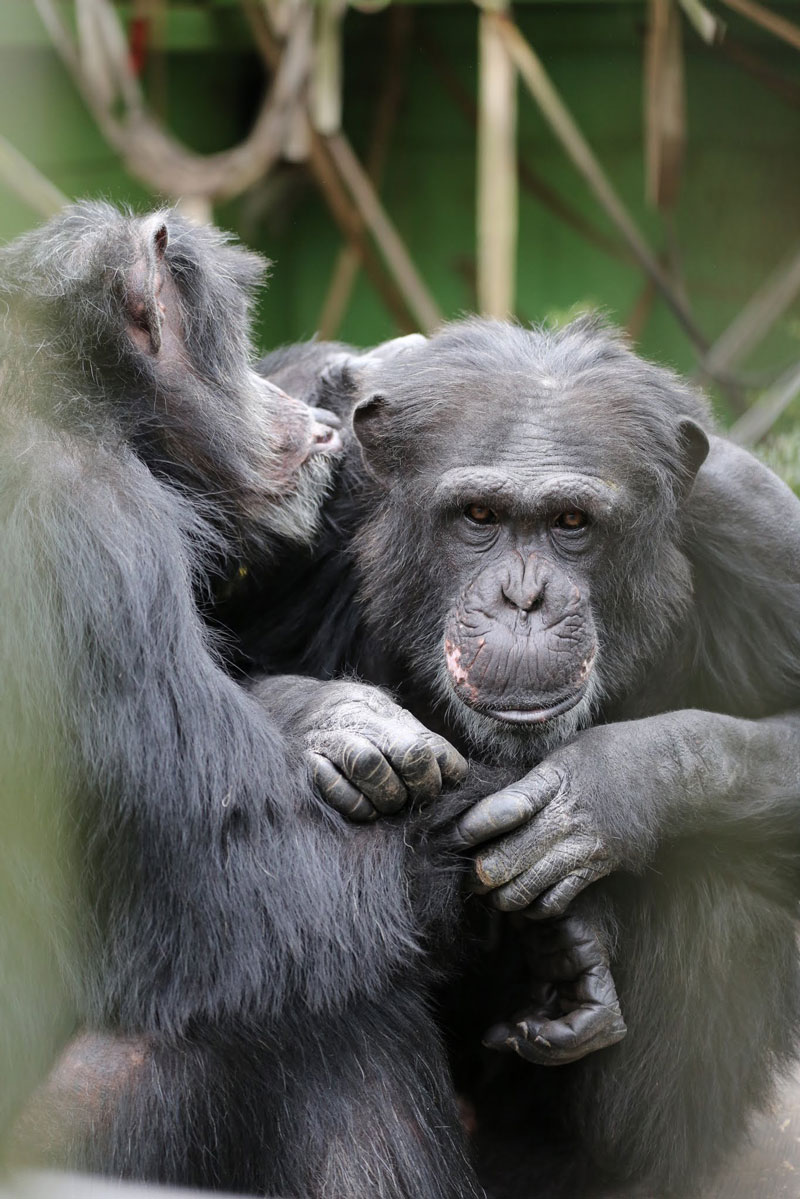飼育チンパンジーにおける社会関係と長期的なストレス
Social relationship and hair cortisol level in captive male chimpanzees (Pan troglodytes)
Yumi Yamanashi, Migaku Teramoto, Naruki Morimura, Etsuko Nogami, Satoshi Hirata
DOI: 10.1007/s10329-017-0641-8Abstract
Understanding how social relationships affect long-term stress is important because stress has a profound impact on the welfare of animals and social relationships often exert a strong influence on their stress responses. The purpose of this study was to investigate the relationship between social behaviors and long-term stress levels as assessed by hair cortisol (HC) concentration. The subjects were 11 chimpanzees living in an all-male group (divided into two sub-groups) in Kumamoto Sanctuary, Kyoto University, Japan. Behavioral data were collected between December 2014 and March 2015. The total observation time was 129 h. Hair samples were collected in late March and early April 2015, and cortisol was extracted from the hair and measured with enzyme immunoassay. The hair growth rate was estimated to be 1.33 ± 0.06 cm/month. The results revealed that there was a positive correlation between the rate of receiving aggression and HC levels. We also found a significant negative correlation between the balance between giving and receiving grooming (grooming balance index: GBI), which was calculated by subtracting the rate with which grooming is given from that with which it is received, and the rate of receiving aggression and between the GBI and HC levels. Thus, individuals receiving higher levels of aggression also tended to give grooming for relatively long periods compared to the time they were being groomed. In contrast, the rate of initiating aggression did not have a relationship with either HC levels or any measure of social grooming. We did not find social buffering effects, as there was no correlation between mutual social grooming and HC levels. These results show that not only aggressive interactions but also overall social situations in which animals do not have balanced relationships with others might result in the long-term elevation of cortisol levels in captive male chimpanzees.
背景
長期的なストレスは,動物の身体的・心理的な健康に大きな影響を与えることがよく知られています。そのため,長期的なストレスにつながりうる要因をあきらかにすることは動物の福祉を考えるうえで極めて重要です。わたしたちの研究グループはこれまで,チンパンジーの体毛を用いて長期的なストレスを評価する試みをおこなってきました(Yamanashi et al., 2013; 2016a; 2016b)。これまでの研究から,チンパンジーにおいて攻撃を受ける頻度と長期的ストレスに正の相関がみられること,また攻撃とストレス反応の関係には性差がみられることなどがわかってきました。しかし親和的社会行動とのストレス状態の関係性について理解が進んでいませんでした。 そこで今回,チンパンジーの遊びやグルーミングに代表される親和的な社会関係が長期的なストレス反応とどのように関わるのかを調べることを目的とした。
研究手法・成果
熊本サンクチュアリのオスグループのチンパンジー11個体を対象としました。行動観察は2014年12月から2015年3月の間におこない,129時間の社会行動データを記録しました。30分毎の個体追跡を繰り返し,グルーミングを30秒ごとに記載し,群れで攻撃交渉と遊び交渉が起きた場合はすべて記録をおこないました。そこから攻撃・グルーミング・遊び頻度を算出し,さらに,グルーミングを一方的にする頻度とされる頻度の差分をグルーミングのバランス指標(GBI)として個体ごとに算出しました。体毛は行動データと対応する時期と考えられる,2015年3月末から4月に上腕部より採取し,体毛中コルチゾル濃度を酵素免疫測定法により測定しました。
結果,先行研究同様攻撃を受ける頻度と体毛中コルチゾル濃度には正の相関がみられた一方,攻撃をおこなう頻度との間には相関がみられませんでした。また攻撃を受ける頻度とGBIには正の相関があり,体毛中コルチゾル濃度とGBIの間にも有意な相関がみられました。グルーミングをおこなう頻度とは有意な相関はありませんでした。以上のことから,チンパンジーは攻撃を受けることだけでなく,他個体との間にバランスのとれた関係性がない(一方的にグルーミングをおこなう時間が長い一方で,グルーミングを返してもらうことが少ないなど)ような状況が長期的なストレス状態につながっている可能性が示唆されました。熊本サンクチュアリではこうした状況を理解しており,飼育環境に柔軟性をもたせ,個体の組み合わせを日ごとに変えるなど,動物のストレスを減少するような取り組みをおこなっていますが,さらなる工夫が求められます。
波及効果
どのような社会関係を築くかが,個体の心身の健康に影響を与えることが過去の研究から示されてきました。仲の良い仲間がいることやその関わりはストレスの減少に大きな役割を果たす一方,社会環境は長期的にストレスを与えることにつながることもあります。これまでチンパンジーにおける社会関係と長期的なストレスの関係についてはほとんど研究されていないことから,社会関係とストレスに関する考察に新たな視座を与えるものであると考えられます。さらに,社会性の高い動物にとって群れでの暮らしは必須ではあるものの,安全な群れ管理は難しいものでもあります。今回の結果は,動物福祉の観点から飼育管理手法を議論するために重要な結果であると考えられます。

Keywords
Social behavior, Hair cortisol, Chimpanzee, Long-term stress, Animal welfare,